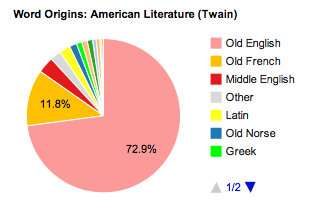Grammar can be a pain in the butt, but who says it can’t be fun?
Etymology, today’s topic, technically doesn’t fall under grammar, but my discovery is too fun not to share with all of you.
A guy who runs the blog Ideas Illustrated has taken it upon himself to apply some color-coding technology to English text to make the concept of English word origins more visual.
If you are a visual person like me, then this endeavor is definitely a welcome one!
What he did was to rely on Douglas Harper’s online dictionary of etymology to determine the language of origin of particular words. He then did some HTML magic (magic for some, common knowledge for others) to come up with visually catching paragraphs.
Let’s take a look at a sample.

This is an excerpt from – you guessed it – Mark Twain’s The Adventures of Tom Sawyer. Obviously, without a guide, those colors mean nothing to you. Take a look at this, though.

Using the legend, it is easy to see that Mark Twain’s work (albeit a very small part of it) uses words that mainly originate from Old English. Not totally surprising, is it?
The writer went further and examined various kinds of texts ranging from legal to medical – even sports! The results were almost the same: majority of the words originate from Old English. While that is not surprising, what I found interesting were the other word origins.
If you take a look at the original post at Ideas Illustrated, I think you will have a bit of a blast clicking on the color-coded words in the passages. They are hyperlinked to their etymology, so you might want to make sure you do not have pressing matters to attend to if you tend to get totally immersed in this kind of thing.
Here’s a question for you. What English word do you know has a strange/interesting origin? My pick is boondocks which comes from the Filipino word bundok. The Online Etymology Dictionary gives this explanation:
1910s, from Tagalog bundok “mountain.” Adopted by occupying American soldiers in the Philippines for “remote and wild place.” Reinforced or re-adopted during World War II. Hence, also boondockers “shoes suited for rough terrain,” originally (1944) U.S. services slang word for field boots.
Isn’t that cool?


Leave a Reply